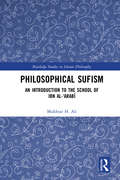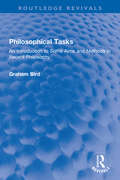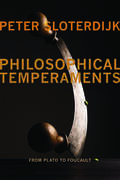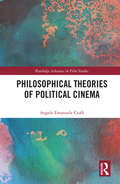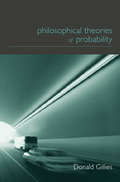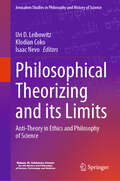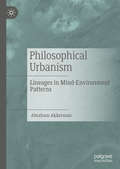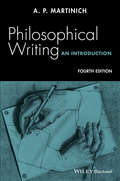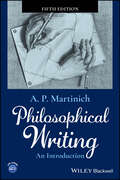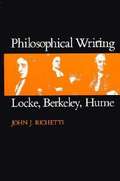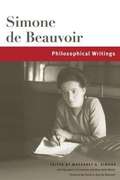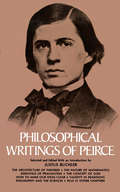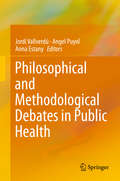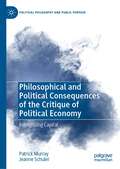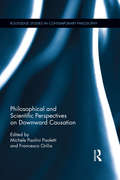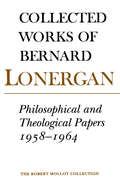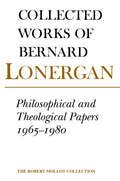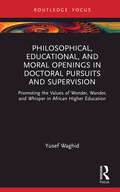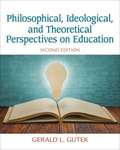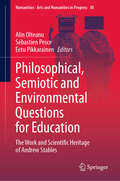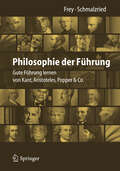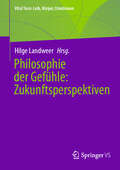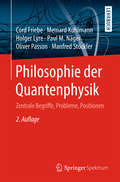- Table View
- List View
Philosophical Sufism: An Introduction to the School of Ibn al-'Arabi (Routledge Studies in Islamic Philosophy)
by Mukhtar H. AliAnalyzing the intersection between Sufism and philosophy, this volume is a sweeping examination of the mystical philosophy of Muḥyī-l-Dīn Ibn al-ʿArabī (d. 637/1240), one of the most influential and original thinkers of the Islamic world. This book systematically covers Ibn al-ʿArabī’s ontology, theology, epistemology, teleology, spiritual anthropology and eschatology. While philosophy uses deductive reasoning to discover the fundamental nature of existence and Sufism relies on spiritual experience, it was not until the school of Ibn al-ʿArabī that philosophy and Sufism converged into a single framework by elaborating spiritual doctrines in precise philosophical language. Contextualizing the historical development of Ibn al-ʿArabī’s school, the work draws from the earliest commentators of Ibn al-ʿArabī’s oeuvre, Ṣadr al-Dīn al-Qūnawī (d. 673/1274), ʿAbd al-Razzāq al-Kāshānī (d. ca. 730/1330) and Dawūd al-Qayṣarī (d. 751/1350), but also draws from the medieval heirs of his doctrines Sayyid Ḥaydar Āmulī (d. 787/1385), the pivotal intellectual and mystical figure of Persia who recast philosophical Sufism within the framework of Twelver Shīʿism and ʿAbd al-Raḥmān Jāmī (d. 898/1492), the key figure in the dissemination of Ibn al-ʿArabī’s ideas in the Persianate world as well as the Ottoman Empire, India, China and East Asia via Central Asia. Lucidly written and comprehensive in scope, with careful treatments of the key authors, Philosophical Sufism is a highly accessible introductory text for students and researchers interested in Islam, philosophy, religion and the Middle East.
Philosophical Tasks: An Introduction to Some Aims and Methods in Recent Philosophy (Routledge Revivals)
by Graham BirdFirst published in 1972, Philosophical Tasks was written to identify and examine some central themes in contemporary Anglo-American philosophy. The book explores the claim that philosophy is essentially linguistic, and considers in particular such topics as philosophy and science, fact and language, conceptual analysis, first- and second-order tasks, scepticism, ordinary language, and conceptual frameworks.
Philosophical Temperaments
by Thomas Dunlap Creston Davis Peter SloterdijkPeter Sloterdijk turns his keen eye to the history of western thought, conducting colorful readings of the lives and ideas of the world's most influential intellectuals. Featuring nineteen vignettes rich in personal characterizations and theoretical analysis, Sloterdijk's companionable volume casts the development of philosophical thinking not as a buildup of compelling books and arguments but as a lifelong, intimate struggle with intellectual and spiritual movements, filled with as many pitfalls and derailments as transcendent breakthroughs.Sloterdijk delves into the work and times of Aristotle, Augustine, Bruno, Descartes, Foucault, Fichte, Hegel, Husserl, Kant, Kierkegaard, Leibniz, Marx, Nietzsche, Pascal, Plato, Sartre, Schelling, Schopenhauer, and Wittgenstein. He provocatively juxtaposes Plato against shamanism and Marx against Gnosticism, revealing both the vital external influences shaping these intellectuals' thought and the excitement and wonder generated by the application of their thinking in the real world. The philosophical "temperament" as conceived by Sloterdijk represents the uniquely creative encounter between the mind and a diverse array of cultures. It marks these philosophers' singular achievements and the special dynamic at play in philosophy as a whole. Creston Davis's introduction details Sloterdijk's own temperament, surveying the celebrated thinker's intellectual context, rhetorical style, and philosophical persona.
Philosophical Temperaments: From Plato to Foucault (Insurrections: Critical Studies in Religion, Politics, and Culture)
by Peter SloterdijkPeter Sloterdijk turns his keen eye to the history of western thought, conducting colorful readings of the lives and ideas of the world's most influential intellectuals. Featuring nineteen vignettes rich in personal characterizations and theoretical analysis, Sloterdijk's companionable volume casts the development of philosophical thinking not as a buildup of compelling books and arguments but as a lifelong, intimate struggle with intellectual and spiritual movements, filled with as many pitfalls and derailments as transcendent breakthroughs.Sloterdijk delves into the work and times of Aristotle, Augustine, Bruno, Descartes, Foucault, Fichte, Hegel, Husserl, Kant, Kierkegaard, Leibniz, Marx, Nietzsche, Pascal, Plato, Sartre, Schelling, Schopenhauer, and Wittgenstein. He provocatively juxtaposes Plato against shamanism and Marx against Gnosticism, revealing both the vital external influences shaping these intellectuals' thought and the excitement and wonder generated by the application of their thinking in the real world. The philosophical "temperament" as conceived by Sloterdijk represents the uniquely creative encounter between the mind and a diverse array of cultures. It marks these philosophers' singular achievements and the special dynamic at play in philosophy as a whole. Creston Davis's introduction details Sloterdijk's own temperament, surveying the celebrated thinker's intellectual context, rhetorical style, and philosophical persona.
Philosophical Theories of Political Cinema (Routledge Advances in Film Studies)
by Angelo Emanuele CioffiThis book utilizes philosophical tools to build up a framework for the classification, analysis, and assessment of political cinema. The author first maps the category of political cinema, clarifying what it means for a film to be ‘political’, and then analyzes the relation between the value of a film as a political film and its value as art. Through philosophical enquiry, Angelo Cioffi builds up a framework that could be of use in art-critical practice and that can help with the classification and assessment of political films. Grounded in analytic philosophy of art and cognitivist film theory, with insights from political science, political philosophy, epistemology, and cognitive science, the book presents a unique analysis of the relation between films and the ‘political’. This theory is tested with detailed case studies, and the author uses specific films as examples of the applicability and explanatory power of this theoretical framework. As such, this book will be of interest not just to film studies, film theory and political philosophy scholars, but to anyone with an interest in political film, aesthetic practice, and philosophy of art.
Philosophical Theories of Probability (Philosophical Issues in Science)
by Donald GilliesThe Twentieth Century has seen a dramatic rise in the use of probability and statistics in almost all fields of research. This has stimulated many new philosophical ideas on probability. Philosophical Theories of Probability is the first book to present a clear, comprehensive and systematic account of these various theories and to explain how they relate to one another. Gillies also offers a distinctive version of the propensity theory of probability, and the intersubjective interpretation, which develops the subjective theory.
Philosophical Theorizing and its Limits: Anti-Theory in Ethics and Philosophy of Science (Jerusalem Studies in Philosophy and History of Science)
by Uri D. Leibowitz Klodian Coko Isaac NevoThis book brings together scholars from ethics and philosophy of science in order to identify ways in which insights gleaned from one subfield can shed light on the other. The book focuses on two radical Anti-Theory movements that emerged in the 1970’s and 1980’s, one in philosophy of science and the other in ethics. Both movements challenged attempts to supply general, systematized philosophical theories within their domains and thus invited the reconsideration of what philosophical theorizing can and should offer. Each of these movements was domain-specific – that is, each criticized the aspirations to philosophical theories within its own domain and advanced arguments aimed at philosophers within their own specific subfield. The innovative systematic comparative examination of these movements by scholars from each domain sheds new light on some familiar debates, offers new and exciting paths of research to pursue in each domain, provides insight into the place of science and ethics in contemporary life and culture, and enables a fresh view on the longstanding and alluring philosophical aspiration for a fully general, absolute theory of reality and an ultimate objective foundational theory of knowledge.
Philosophical Thinking An Introduction
by Monroe C. Beardsley Elizabeth Lane BeardsleyThe titles of the major parts of this philosophy book are: I. Philosophy of Religion, II. The Existence of God, III. Immorality and the Problem of Evil, IV. Faith and Reason, V. Perception, VI. Empirical Knowledge, VII. Necessary Truth, VIII. Meaning and Intuition, IX. The Physical World, X. Living Matter, XI. Human Nature, XII. Ethical Judgment.
Philosophical Urbanism: Lineages in Mind-Environment Patterns
by Abraham AkkermanThis book expands on the thought of Walter Benjamin by exploring the notion of modern mind, pointing to the mutual and ongoing feedback between mind and city-form. Since the Neolithic Age, volumes and voids have been the founding constituents of built environments as projections of gender—as spatial allegories of the masculine and the feminine. While these allegories had been largely in balance throughout the early history of the city, increasingly during modernity, volume has overcome void in city-form. This volume investigates the pattern of Benjamin's thinking and extends it to the larger psycho-cultural and urban contexts of various time periods, pointing to environ/mental progression in the unfolding of modernity.
Philosophical Writing
by A. P. MartinichPhilosophical Writing: An Introduction, 4th Edition, features numerous updates and revisions to A. P. Martinich's best-selling text that instructs beginning philosophy students on how to craft a well-written philosophical essay. Features an entirely new chapter on how to read a philosophical essay, new sections on quantification and modality, and rhetoric in philosophical writing, as well as more updated essay examples Includes many new essay examples and an accompanying website with further topics and examples Traces the evolution of a good philosophical essay from draft stage to completion Emphasizes what a student should do in crafting an essay, rather than on what not to do Written with clarity and humor by a leading philosopher
Philosophical Writing: An Introduction
by A. P. MartinichPhilosophical Writing helps students to think clearly and analytically, improve their essay-writing skills, and present their knowledge and thoughts in a precise and coherent manner. Acclaimed for its accessible, highly practical approach, this bestselling textbook emphasizes what students should do in crafting a philosophical essay, as well as other types of essays that analyze concepts across a variety of disciplines. Tracing the evolution of a good philosophical essay from the draft stage to completion, the book's eleven chapters are purpose-built to serve the needs of a wide range of students, with levels ranging from elementary to moderately advanced. Philosophical Writing includes numerous essay examples, techniques for outlining and composing, guidance on evaluating philosophical essays, useful appendices, a glossary, a full-featured companion website, and more. Now in its fifth edition, Philosophical Writing is fully updated with enhanced language and improved explanations throughout. Two entirely new chapters delve into the intricacies of belief networks and explore the properties of sound interpretations, supported by a wealth of new exercises and discussion questions. Written with clarity and humor by a leading analytic philosopher, Philosophical Writing: Helps students organize their beliefs, assess their interpretations, and critically evaluate the ideas of others Explains the basic concepts of logic and rhetoric, the structure of a philosophical essay, and the criterion of good philosophical writing Describes key tactics for analytic writing, such as definitions, analysis, counterexamples, and dialectical reasoning Discusses the concepts of author and audience as they apply to a student's philosophical writing Offers advice on common problems that students encounter when writing a philosophical essay Philosophical Writing: An Introduction, Fifth Edition, remains an ideal textbook for lower- and upper-division courses in philosophy, particularly introductory philosophy classes, as well as courses with significant writing components that cover logic, rhetoric, and analysis.
Philosophical Writing: Locke, Berkeley, Hume
by John J. RichettiIn this book John Richetti suspends purely philosophical questions in order to analyse the writing strategies of the three great eighteenth-century British philosophers.
Philosophical Writings
by Simone De Beauvoir Margaret SimonsDating from her years as a philosophy student at the Sorbonne, this is the 1926-27 diary of the teenager who would become the famous French philosopher, author, and feminist, Simone de Beauvoir. Written years before her first meeting with Jean-Paul Sartre, these diaries reveal previously unknown details about her life and offer critical insights into her early philosophy and literary works. Presented here for the first time in translation and fully annotated, the diary is completed by essays from Barbara Klaw and Margaret A. Simons that address its philosophical, historical, and literary significance. The volume represents an invaluable resource for tracing the development of Beauvoir's independent thinking and influence on the world.
Philosophical Writings of Peirce
by Justus Buchler Charles S. PeirceCharles S. Peirce was a thinker of great originality and power. Although unpublished in his lifetime, he was recognized as an equal by such men as William James and John Dewey and, since his death in 1914, has come to the forefront of American philosophy. This volume, prepared by the Johnsonian Professor of Philosophy at Columbia University, formerly chairman of Columbia's philosophy department, is a carefully balanced exposition of Peirce's complete philosophical system as set forth in his own writings.The 28 chapters, in which appropriate sections of Peirce's work are interwoven into a brilliant selection that reveals his essential ideas, cover epistemology, phenomenology, cosmology, and scientific method, with especially interesting material on logic as the theory of signs, pure chance vs, pure law in the universe, symbolic logic, common sense, pragmatism (of which he was the founder), and ethics.Justus Buchler is author of Charles Peirce's Empiricism (1939), Philosophy: An Introduction (with J. H. Randall, Jr., 1942), and more recently, a series of books which form an ongoing philosophic structure: Toward a General Theory of Human Judgement (1951), Nature and Judgment (1855), and The Concept of Method (1961).
Philosophical and Methodological Debates in Public Health
by Jordi Vallverdú Angel Puyol Anna EstanyThis interdisciplinary volume gathers selected, refereed contributions on various aspects of public health from several disciplines and research fields, including the philosophy of science, epidemiology, statistics and ethics. The contributions were originally presented at the 1st Barcelona conference of “Philosophy of Public Health” (5th – 7th May 2016). This book is intended for researchers interested in public health and the contemporary debates surrounding it.
Philosophical and Political Consequences of the Critique of Political Economy: Recognizing Capital (Political Philosophy and Public Purpose)
by Patrick Murray Jeanne SchulerThis book extends the approach that Murray and Schuler develop in their companion volume, False Moves in Philosophy and Social Theory: Losing Public Purpose. The chapters form a connected inquiry into consequences of capital, a far-reaching social form, through a critique of political economy and the mindset it shares with much modern philosophy and social theory. The authors call this bifurcating mentality factoring philosophy. Factoring philosophy mistakes the distinguishable for the separable. It splits the subjective and objective, form and content, and it takes the object of social theory to be an impossible economy-in-general, stripped of constitutive social forms. The critique of factoring philosophy structures the collection, which makes a wide-ranging contribution to the research field of the critique of political economy as critical social theory. Ultimately, this book solidifies Murray and Schuler’s impact on the study of political economy, political philosophy, modern philosophy, Hegel, Marx, and critical theory.
Philosophical and Scientific Perspectives on Downward Causation (Routledge Studies in Contemporary Philosophy)
by Francesco Orilia Michele Paolini PaolettiDownward causation plays a fundamental role in many theories of metaphysics and philosophy of mind. It is strictly connected with many topics in philosophy, including but not limited to: emergence, mental causation, the nature of causation, the nature of causal powers and dispositions, laws of nature, and the possibility of ontological and epistemic reductions. Philosophical and Scientific Perspectives on Downward Causation brings together experts from different fields—including William Bechtel, Stewart Clark and Tom Lancaster, Carl Gillett, John Heil, Robin F. Hendry, Max Kistler, Stephen Mumford and Rani Lill Anjum —who delve into classic and unexplored lines of philosophical inquiry related to downward causation. It critically assesses the possibility of downward causation given different ontological assumptions and explores the connection between downward causation and the metaphysics of causation and dispositions. Finally, it presents different cases of downward causation in empirical fields such as physics, chemistry, biology and the neurosciences. This volume is both a useful introduction and a collection of original contributions on this fascinating and hotly debated philosophical topic.
Philosophical and Theological Papers, 1958-1964: Volume 6
by Bernard Lonergan Robert Doran, S.J. Frederick Crowe, S.J. Robert CrokenThe period during which Bernard Lonergan delivered the eleven lectures in this volume was one of important transition for him: he was moving rapidly toward a new conception of theology and its method; and he was on the verge of what is now recognized as a major breakthrough in his thought on method, the idea that came to him in February 1965 of the eight functional specialities. While the lectures maintain a continuity with Lonergan's previous work, they also reveal new and significant ideas, especially in regard to his drive toward a new conception of theology as a whole, and his particular concern for the relevance of theology to the spiritual life. The lectures here include 'The Redemption,' 'Method in Catholic Theology,' 'The Philosophy of History,' 'The Origins of Christian Realism,' `Time and Meaning,' 'Consciousness and the Trinity,' `Exegesis and Dogma,' 'The Mediation of Christ in Prayer,' 'The Analogy of Meaning,' 'Philosophical Positions with Regard to Knowing,' and 'Theology as Christian Phenomenon.' This volume provides a key to understanding the development of Lonergan's philosophical and theological thought, his major influences, and the pivotal moments of transition in the road leading up to Method in Theology and beyond.
Philosophical and Theological Papers, 1965-1980: Volume 17
by Bernard Lonergan Robert Doran, S.J. Robert CrokenA companion to Philosophical and Theological Papers 1958-1964 (Volume 6 in the Collected Works of Bernard Lonergan series), this anthology contains Lonergan's lectures on philosophy and theology given during the later period of his life, 1965-1980. These papers document his development in the discipline during the years leading up to the publication of Method in Theology, and beyond to 1980 when he was more engaged in his writings and seminars on macroeconomics. Philosophical and Theological Papers 1965-1980 is divided into five sections, forming units on the basis of dates. The three central sections are each a set of lectures respectively given at the Massachusetts Institute of Technology, Gonzaga University in Spokane, and Trinity College (University of Toronto). Although there is some repetition amongst the lecture sets and in relation to other more familiar works, this repetition displays occasional new turns of phrase that the careful reader will note. In at least one instance, familiar material suddenly opens out onto expressions not to be found anywhere else in Lonergan's work. Other very interesting developments regard the movement from speaking of the immutability of dogmas to their permanence of meaning and the permutations among 'real self-transcendence,' 'performative self-transcendence,' and 'moral self-transcendence.'
Philosophical, Educational, and Moral Openings in Doctoral Pursuits and Supervision: Promoting the Values of Wonder, Wander, and Whisper in African Higher Education (Routledge Research in Higher Education)
by Yusef WaghidThis timely volume conceptualises and applies the philosophical notions of wonder, wander, and whisper, serving as evaluative paradigms for objective assessment of quality doctoral research work and supervision in South African higher education. Written by one of the foremost academics in the field, the book combines the normative philosophical, educational, and moral notions of wonder, wander, and whisper with academic life and studies, focusing on doctoral work and supervision not just as cognitive or scientific processes, but also as existential, ethical, and political shaping of the self. By reflecting on three decades of doctoral supervision, the author gives an account of how his students have been initiated into moral discourses of democratic citizenship education and the intellectual adventures they have embarked upon through scholarly texts. The book also presents itself as a decolonial venture that repositions and resituates doctoral education in resistance to the hegemony of colonisation, inhumanity, inequality, unfreedom, and injustice in Southern Africa. Ultimately arguing for the relevance of wonder, wander, and whisper in academic culture, the book will appeal to scholars, researchers, and postgraduates in the fields of higher education, philosophy of education, and sociology of education as well as African education and doctoral studies more broadly.
Philosophical, Ideological, and Theoretical Perspectives on Education
by Gerald L. GutekGerald Gutek's Philosophical, Ideological, and Theoretical Perspectives on Education uses a systems approach to help readers examine the major schools of philosophy of education; consider the relationship of education to major ideologies including Nationalism, Liberalism, Conservatism, and Marxism; and analyze the impact of philosophy and ideology on educational theory and practice through the theories of Essentialism, Perennialism, Social Reconstruction, and Critical Theory. The concepts are made clear through the book's helpful chapter organization, which includes definitions of terms; historical contributors and antecedents; a general discussion of the particular philosophy, ideology, or theory; and relationship and application to education, especially to schools, curriculum, instruction, and to teachers and students.
Philosophical, Semiotic and Environmental Questions for Education: The Work and Scientific Heritage of Andrew Stables (Numanities - Arts and Humanities in Progress #30)
by Alin Olteanu Eetu Pikkarainen Sébastien PesceThis collected volume celebrates the life and work of the late Andrew Stables, a renowned scholar in semiotics and in educational philosophy and theory. He is known, in particular, for having pioneered the semiotic approach to education. This book celebrates his work with scholarly contributions by leading researchers in these areas of scholarship, reflecting on Andrew Stables&’ thought and intellectual legacy. The contributions are interdisciplinary, which reflects Stables&’ eclectic work. Also included are new and unpublished texts of Andrew Stables. The text is divided into three parts: Philosophy of Education, Learning as Semiotic, and Environmental Literacies. It appeals to students and researchers working in philosophy of education broadly, semiotic-oriented approaches to education, as well as discussions on multimodality.
Philosophie der Führung
by Dieter Frey Lisa Katharin SchmalzriedFührungskräfte arbeiten heute in einem unsicheren Umfeld mit wachsenden Anforderungen und immer variableren Rahmenbedingungen. Dennoch müssen sie Sicherheit ausstrahlen und ihren Mitarbeitern eine Orientierung bieten. Viele Führungskräfte empfinden dies als belastend und suchen nach einer Art Kompass, an dem sie ihr Handeln ausrichten können, nach dauerhaften Prinzipien für eine "gute Führung". Dieses Buch bietet einen solchen Kompass und leitet dazu "neue" Erkenntnisse aus uralten Theorien ab: Hätten Sie gedacht, dass die großen Philosophen von Kant über Rousseau bis Popper Anregungen für Ihr tägliches Führungshandeln bereit halten? - Wie Sie nach Ansicht Aristoteles als Chef ein gutes Vorbild werden? Wie Sie laut Hobbes mit egoistischen Mitarbeitern umgehen können? Wie nach Popper ein kritischer Dialog zu besseren Entscheidungen führen kann? Den Autoren dieses Buches gelingt es, in übersichtlichen Kapiteln verständlich und knapp die Grundlagen einer Theorie zu erklären, praktische Hinweise für eine moderne Führungskraft abzuleiten und schließlich ein verständliches Modell einer ethikorientierten Führung zu formulieren. - Kernthese: Gute Führung, die sich moralischen Werten verpflichtet sieht, ist auch eine erfolgreiche Führung! Und ganz nebenbei liest sich das Buch als eine unterhaltsame Einführung in die großen philosophischen Theorien. Für alle, die mit Aufgaben der Menschenführung betraut sind, ob in sozialen und kommerziellen Organisationen, im Bildungsbereich oder der Kindererziehung.
Philosophie der Gefühle: Zukunftsperspektiven (Vital Turn: Leib, Körper, Emotionen)
by Hilge LandweerDieser Band wirft die Frage nach der gesellschaftlichen Relevanz der inzwischen sehr differenzierten Debatte um die Philosophie der Gefühle auf und bietet ihr so eine neue Orientierung an. In einer 2022 organisierten Diskussion zwischen einigen international renommierten Emotionsforscher*innen mit Nachwuchswissenschaftler*innen, die im Bereich der Philosophie der Gefühle arbeiten, kristallisierten sich vier Bereiche heraus, die besonders aufschlussreich sind: 1. die Rolle von emotionstheoretische Weichenstellungen in der Philosophiegeschichte für aktuelle Orientierungen; 2. phänomenologische Beschreibungen einzelner Gefühle, die in der aktuellen Debatte noch wenig thematisiert werden, aber in deutlichem Zusammenhang mit normativen Fragen oder aktuellen Konfliktlagen stehen; 3. folgenreiche theoretische Kontroversen und Felder, die in der heutigen Philosophie der Gefühle noch zu entdecken sind; 4. die Ontologie des Sozialen und die Affekte.
Philosophie der Quantenphysik: Einführung Und Diskussion Der Zentralen Begriffe Und Problemstellungen Der Quantentheorie Für Physiker Und Philosophen
by Paul M. Näger Cord Friebe Meinard Kuhlmann Holger Lyre Oliver Passon Manfred StöcklerDieses Buch liefert dem Leser eine aktuelle und fundierte Einführung in die Philosophie der Quantenphysik. Obwohl sich die Quantentheorie durch spektakuläre empirische Erfolge auszeichnet, wird bis heute kontrovers diskutiert, wie sie zu verstehen ist. In diesem Werk geben die Autoren einen Überblick über die zahlreichen philosophischen Herausforderungen: Verletzen Quantenobjekte das Prinzip der Kausalität? Sind gleichartige Teilchen ununterscheidbar und daher keine Individuen? Behalten Quantenobjekte in der zeitlichen Entwicklung ihre Identität? Wie verhält sich ein zusammengesetztes Quantensystem zu seinen Teilen? Diese Fragen werden im Rahmen verschiedener Deutungsansätze der Quantentheorie diskutiert. Ein Ausblick in die Quantenfeldtheorie verschärft das Hauptproblem der Nichtlokalität.Philosophie der Quantenphysik richtet sich an Philosophiestudierende mit Interesse für Physik, macht Physikerinnen und Physiker mit den philosophischen Fragen ihres Faches vertraut und liefert Lehramtsstudierenden und Lehrern Anregungen für den gymnasialen Physik-Unterricht. Das Buch schließt damit eine Lücke zwischen populären Einführungen und spezialisierten Monografien zur Philosophie der Quantenphysik im deutschsprachigen Lehrbuchmarkt. In der vorliegenden zweiten Auflage wurde das Kapitel zu Verschränkung und Nicht-Lokalität deutlich erweitert und jedes Kapitel mit Übungsaufgaben und Musterlösungen ergänzt.
